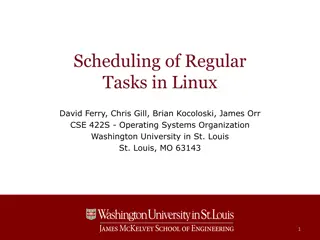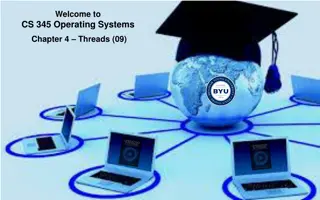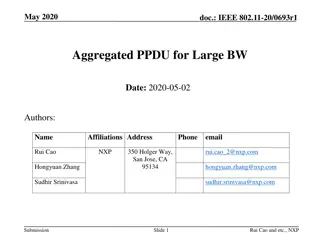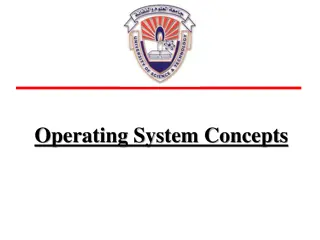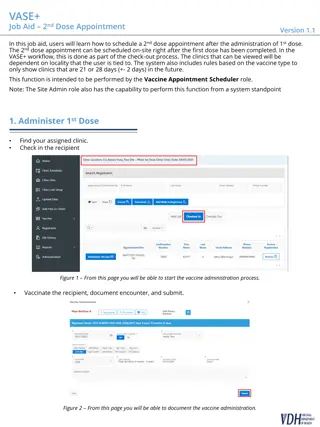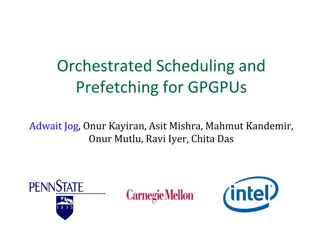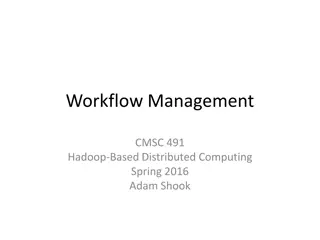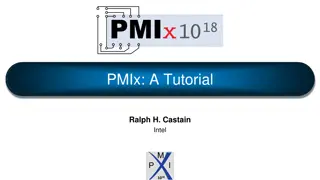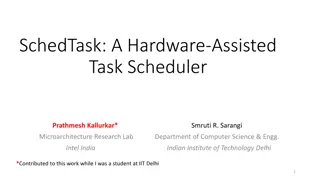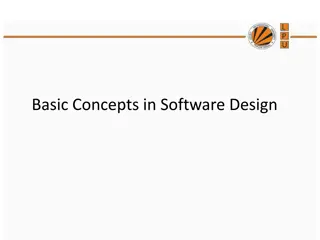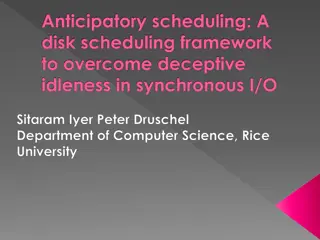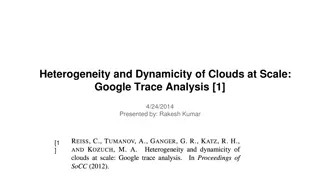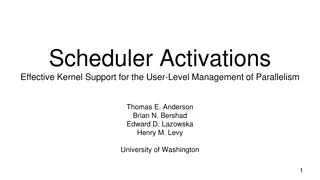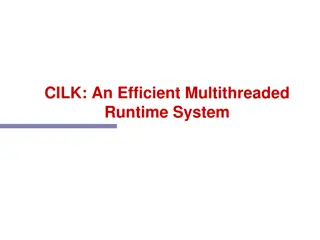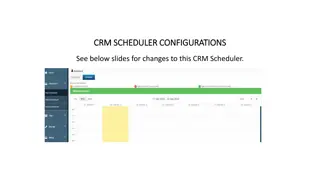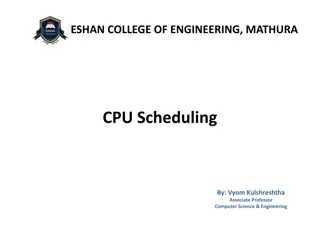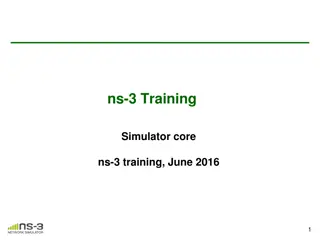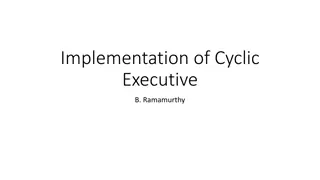Understanding Linux Process Scheduling and Priorities
Delve into the intricacies of process scheduling in Linux systems, covering topics such as task prioritization, process states, scheduler decisions, and important scheduling scenarios. Learn about traditional scheduling concerns like throughput and latency, as well as different types of workloads su
3 views • 19 slides
Understanding Software Analysis and Design Process
Software analysis and design involve a systematic approach to understanding user requirements, creating logical models, and transitioning to detailed design specifications. Requirements analysis focuses on capturing system requirements, while design translates these requirements into implementation
7 views • 16 slides
Understanding Class Schedule Maintenance in Higher Education
The Department Scheduler is responsible for maintaining class schedules in BANNER, following policies like credit hour definitions and campus teaching schedules. The process involves collaboration with instructors, updating BANNER, and ensuring accuracy in student registrations. Tools like FMS, Cour
0 views • 26 slides
Guidelines for Design of Cement Concrete Pavement and Interlocking Paver Blocks
This document provides guidelines for designing cement concrete pavements and interlocking paver blocks, covering factors governing design, wheel loads, design period, subgrade characteristics, approximate k values based on CBR values, and the importance of a sub-base below concrete pavements. It em
0 views • 67 slides
Understanding Threads and Task Scheduling in Operating Systems
Threads and task scheduling play a crucial role in modern operating systems. This chapter delves into the concept of threads, including standard integer typedefs and the importance of multitasking. It explores the implementation of a five-state task scheduler capable of executing multiple tasks effi
0 views • 25 slides
Enhancing Throughput with Aggregated PPDU for Large Bandwidth IEEE 802.11 Networks
This document discusses the implementation of Aggregated PPDU to boost throughput in IEEE 802.11 networks with large bandwidth. The focus is on accommodating various STAs with different operating bandwidths and optimizing traffic flow. By utilizing Aggregated PPDU, significant gains in throughput ca
5 views • 7 slides
Software Engineering Design Principles and Concepts
The chapter discusses the essential principles and concepts in software design, highlighting the four key design models - data design, architectural design, interface design, and component-level design. It emphasizes the importance of traceability to the analysis model, minimizing the gap between so
0 views • 36 slides
ROSS Rail Ops Shift Scheduler Overview
ROSS Rail Ops Shift Scheduler provides a detailed outline of schedules, timelines, and basics for managing shifts and trips in railway operations. It covers types of trains, individual schedules, and tracking components, offering insights into trip assignments, furlough shifts, and trip variations.
0 views • 26 slides
Understanding CPU Scheduling in Operating Systems
In a single-processor system, processes take turns running on the CPU. The goal of multiprogramming is to keep the CPU busy at all times. CPU scheduling relies on the alternating CPU and I/O burst cycles of processes. The CPU scheduler selects processes from the ready queue to execute when the CPU i
1 views • 26 slides
VASE+ Job Aid 2nd Dose Appointment Scheduling
Users will learn how to schedule a 2nd dose appointment after administering the 1st dose in the VASE+ workflow. The process involves identifying the recipient needing the 2nd dose, selecting a suitable clinic date, verifying recipient information, choosing an available appointment slot, and confirmi
0 views • 6 slides
Orchestrated Scheduling and Prefetching for GPGPUs
This paper discusses the implementation of an orchestrated scheduling and prefetching mechanism for GPGPUs to enhance system performance by improving IPC and overall warp scheduling policies. It presents a prefetch-aware warp scheduler proposal aiming to make a simple prefetcher more capable, result
0 views • 46 slides
Introduction to Apache Oozie Workflow Management in Hadoop
Apache Oozie is a scalable, reliable, and extensible workflow scheduler system designed to manage Apache Hadoop jobs. It facilitates the coordination and execution of complex workflows by chaining actions together, running jobs on a schedule, handling pre and post-processing tasks, and retrying fail
0 views • 24 slides
Understanding System on Chip (SoC) Design and Components
Explore the world of System on Chip (SoC) design, components, and working flow. Learn about Intellectual Properties (IP), platform-based design, typical design flows, top-down design approach, and the emerging Electronic System Level (ESL) design flow. Discover the essential components of an SoC, su
0 views • 45 slides
Exploring Design Inspiration and Elements in Costume and Fashion Design
Dive into the world of costume and fashion design through a visual journey of finding design inspiration, understanding the design process, emphasizing originality, and exploring different sources of creativity. Discover how technology, art, food, history, architecture, and nature can spark innovati
0 views • 45 slides
Enhancing Piping Design Efficiency with Spec-Driven Technology
Explore how Spec-Driven Piping technology powered by CADACTIVE offers a standardized approach for piping design in Creo Parametric. This innovative extension streamlines design communication, eliminates errors, and improves design efficiency by utilizing a master catalog, automated checking capabili
0 views • 15 slides
Overview of PMIx: A Comprehensive Tutorial
Dive into an in-depth tutorial on PMIx, covering topics such as server and scheduler overview, client tools, terminology, session allocation, job management, application workflows, and launch sequences. Explore the changing landscape of programming models and runtime proliferation, along with strate
0 views • 117 slides
Effective Rules of Engagement for Microsoft Project and Excel Users
Speaker Clifford Andrews, Master Scheduler at Absa Bank, shares insights on implementing PPM Online and Microsoft Project Systems. Learn about key settings and data export/import processes between Microsoft Project and Excel for efficient project management.
0 views • 5 slides
Material Design: Combining Classic Design Principles with Technological Innovation
Material Design is a design language that combines traditional design principles with the possibilities offered by technology and science. It emphasizes visual language, classic design elements, and innovation to create delightful user experiences. The Material Metaphor, Imagery, Typography, Color,
0 views • 34 slides
Comprehensive Guide to System Design Components and Techniques
System design involves the detailed planning and identification of components in an information system, aiming to provide users with a general understanding of the new system. This process includes techniques like flowcharts, prototyping, and component design, covering aspects such as output design,
0 views • 24 slides
Hardware-Assisted Task Scheduler for OS Intensive Applications
A hardware-assisted task scheduler called SchedTask is proposed to address the issue of instruction cache pollution in OS intensive applications. By utilizing SuperFunction characterization and a specialized scheduler, the system aims to optimize task execution on different cores for improved perfor
0 views • 28 slides
Understanding Design Patterns: A Comprehensive Overview
Exploring the world of design patterns, this content delves into the essence of design patterns, their application in software design to resolve complexity, and the different types of design patterns - creational, structural, and behavioral. It also showcases examples of popular design patterns such
0 views • 22 slides
Understanding Basic Concepts in Software Design
Software design involves transforming customer requirements into a form suitable for implementation, with activities categorized into preliminary and detailed design stages. High-level design focuses on module identification and control relationships, while detailed design entails defining data stru
1 views • 24 slides
Overcoming Deceptive Idleness with Anticipatory Scheduling
Addressing the issue of deceptive idleness in disk scheduling by implementing an anticipatory scheduling framework that leverages prefetching and anticipation core logic. This framework enhances the efficiency of handling synchronous I/O processes to prevent premature decision-making by the schedule
0 views • 21 slides
End-to-End Delay Control of Multimedia Applications over Multihop Wireless Links
Pervasive multimedia communications face challenges like channel fading and interference, making end-to-end delay control crucial in multi-hop wireless networks. This study discusses QoS requirements, upper-layer adaptation, and frameworks for ensuring optimal multimedia packet delivery. Techniques
0 views • 18 slides
Exploring 3D Design and Critical Analysis in Architecture
Dive into the world of 3D design and critical analysis with a focus on architecture. Discover the stages of design, essential skills for designers, and areas of study in three-dimensional design. Delve into iconic buildings like Frank Lloyd Wright's Falling Water, analyze their key features, and eve
0 views • 9 slides
Understanding Design Patterns in Object-Oriented Design
Design patterns in object-oriented design (OOD) are essential templates that codify best practices for solving common problems. They help streamline development by capturing proven design decisions, promoting code reuse, and enhancing system flexibility and modularity. Learn about the core concepts,
0 views • 20 slides
CS260 Parallel Algorithms: Theory and Practice Review
This review covers essential topics from the CS260 Parallel Algorithms course by Yihan Sun, focusing on key concepts such as scheduler programs, cost models, reduce and scan techniques, PRAM models, atomic primitives, small algorithms, the master theorem, and sorting algorithms like Quicksort and Me
0 views • 25 slides
Understanding Interaction Design in Human-Computer Interaction
Interaction design focuses on creating interactive products that are easy, effective, and enjoyable to use. It aims to reduce negative user experiences while enhancing positive ones. Designing interactive products requires understanding user activities, interfaces, and device arrangements to support
0 views • 11 slides
SE2811 Software Component Design Overview
This course covers software component design, design patterns, object-oriented design, algorithms, and opportunities for reuse in systems design. It emphasizes the importance of domain-level design and provides insights into solving core problems through reusable classes.
0 views • 21 slides
Understanding Cloud Heterogeneity and Dynamicity: A Google Trace Analysis
Exploring the heterogeneity and dynamic nature of clouds at scale using Google Trace Analysis, focusing on machine allocation, workload types, job durations, task shapes, and machine churn. The study offers insights into resource allocation in evolving multi-tenant clusters and highlights the challe
0 views • 16 slides
Analysis of Bunch Lengthening in CEPC for Different Design Parameters
This study explores bunch lengthening in the Circular Electron Positron Collider (CEPC) for various design parameters, analyzing a 54 km design scheme, a 61 km design scheme, and a 100 km design scheme. The analysis includes the theoretical framework used, equations for bunch lengthening, and conclu
1 views • 15 slides
User-Level Management of Parallelism: Scheduler Activations
This content delves into the comparison between kernel-level threads and user-level threads in managing parallelism. It discusses the challenges and benefits associated with each threading model, highlighting the trade-offs between system overhead, flexibility, and resource utilization. The concept
0 views • 39 slides
Helpful Updates and Features in axiUm 6.0 Upgrade
Discover the latest enhancements in the axiUm 6.0 upgrade, including improvements in language settings, chart locking, patient exposures, scheduler module, status bar notifications, required actions, and more. Stay informed and efficient with the new features at your disposal.
0 views • 30 slides
Understanding CILK: An Efficient Multithreaded Runtime System
CILK is a multithreaded runtime system designed to develop dynamic, asynchronous, and concurrent programs efficiently. It utilizes a work-stealing thread scheduler and relies on a directed acyclic graph (DAG) model for computations. With a focus on optimizing critical paths and total work, CILK enab
0 views • 44 slides
Customizable CRM Scheduler with Appointment Calendar for Clients
Implement a customizable CRM scheduler with a user-friendly appointment calendar for clients and customers. Allow easy scheduling, cost estimates, demographic data collection, and communication features. Enhance the scheduler with new event types, break time configuration, appointment types, and not
0 views • 9 slides
Understanding CPU Scheduling Concepts at Eshan College of Engineering, Mathura
Dive into the world of CPU scheduling at Eshan College of Engineering in Mathura with Associate Professor Vyom Kulshreshtha. Explore topics such as CPU utilization, I/O burst cycles, CPU burst distribution, and more. Learn about the CPU scheduler, dispatcher module, scheduling criteria, and the impl
0 views • 18 slides
WhatsApp Scheduler How to schedule WhatsApp messages
Scheduling WhatsApp messages is an indispensable tool for business owners and professionals. This feature allows you to automatically send messages at a specific time, which is extremely useful for a variety of situations. Imagine you need to send pa
0 views • 10 slides
WhatsApp Scheduler How to schedule WhatsApp messages
Scheduling WhatsApp messages is an indispensable tool for business owners and professionals. This feature allows you to automatically send messages at a specific time, which is extremely useful for a variety of situations. Imagine you need to send pa
4 views • 10 slides
Understanding ns-3 Training Simulator Core Concepts
ns-3 Training Simulator core concepts involve simulation time events, scheduler commands, random variables, virtual time advancement, program flow handling, command-line arguments, time management, event execution, and scheduler functionalities. Learn about handling program inputs, configuring topol
2 views • 17 slides
Implementation of Cyclic Executive in Real-Time Systems
Exploring the implementation of a cyclic executive in real-time systems through task specifications, scheduler design, and program code examples. This approach involves executing tasks in a predictable sequence within fixed time slots to achieve precise timing requirements.
0 views • 10 slides
